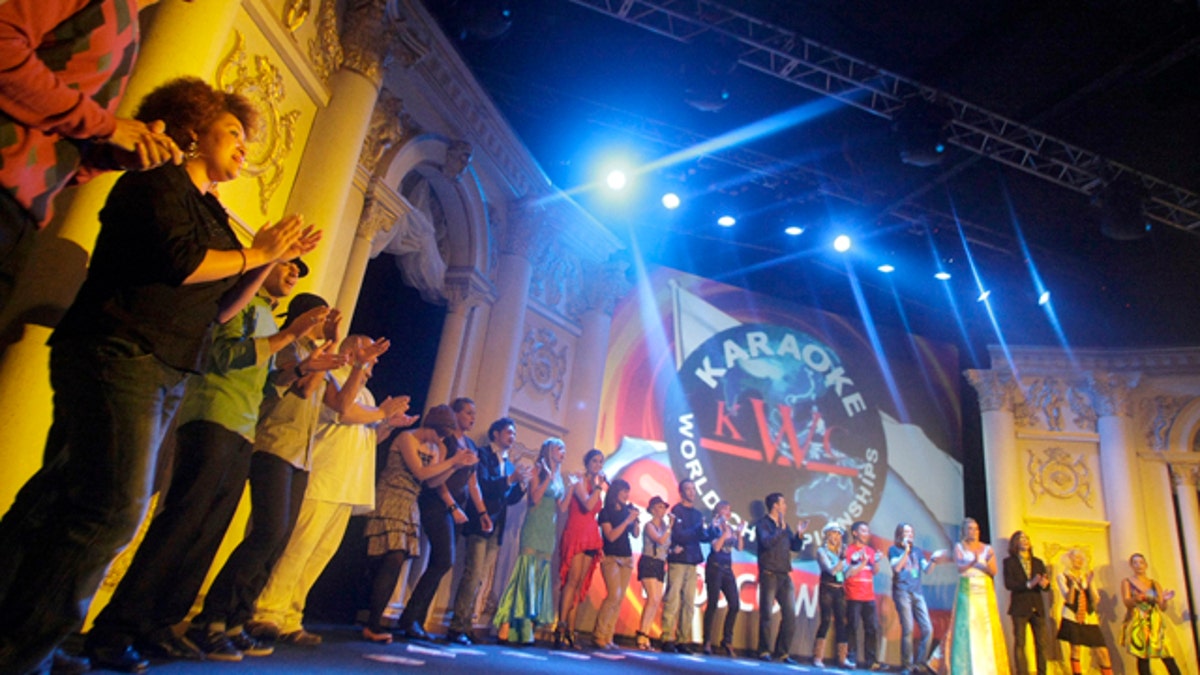
September 23: Participants in the Karaoke World Championships open the show with a group rendition of "We Are The World" in Moscow, Russia. (AP)
MOSCOW – MOSCOW (AP) — The winner of the Karaoke World Championships may not achieve world fame, but at least he or she won't have to worry where the next meal is coming from — the top prize is 1 million Russian dumplings.
With an unusual purse like that, it's clear that karaokists retain a sense of humor about a pursuit as derided as it is popular. But they're also serious enough about it to have traveled from as far away as Australia and Nigeria for a three-day battle-of-the-no-bands in a Moscow banquet hall.
The first night of the competition Thursday seems to show that karaoke is at a tipping point. It's gone far beyond caterwauling in front of a group of sozzled buddies and regretting it the next morning; most of those on stage here have serious pipes and carefully worked-out moves. Yet it retains the casual camaraderie of a barroom at midnight.
"It's a contest, yes, but it's more like a family," said Atte Hujanen, managing director of the Finland-based KWC Organization that is the equivalent of a sports governing body.
One woman's rendition of "Vogue" proved his point. Imagine Madonna if she'd never been to a gym, moved awkwardly and dressed like a diplomat. Still, the applause was warm, cameras flashed and no journalists seemed inclined to ask if the performance was intended ironically.
Karaoke actually seems to be one of the world's few genuine irony-free zones. The performers don't go for modernist mumbling or cryptic lyrics — they love to belt it out and they go for songs with heart-on-the-sleeve words. The show began with a group rendition of that apogee of bathos "We Are The World" and a probably inevitable version of "My Way" occurred not long thereafter.
Hujanen posited that it's this penchant for intensity that makes karaoke especially appealing in propriety-intensive countries such as Japan, where it originated, and his homeland, where six of the eight world championships have been held.
"People in Japan and Finland, it's in our nature that we're pretty shy," he said. With karaoke, "we can sing a heartbreaking ballad and then shut up again."
It's also liberating for serious performers because it doesn't require them to pursue a particular genre or artistic vision, as they would if they were part of an actual band, said American contestant Edward Pimentel, a technician for a cellular phone company in Albuquerque.
"The places I go to have 20,000 songs. I can change every single night," he said. "I can do whatever."
They can also choose to look whatever. The show Thursday had the sartorial variation of a good neighborhood bar — some men with snap-brim hats looking like dudes on the make, some in sneakers and untucked shirts looking like they'd stopped in for a cold one after a long shift at a gas station.
But the emotions were higher for the singers than in a bar, said Tami Marie, also of Albuquerque, a standout with a searing version of Pink's "Misery."
"Here, you feel like a real star. ... I feel so blessed," she gushed.
However, the most gushing person to take the stage arguably wasn't a performer at all, but the Russian organizer of the competition, Alexander Shamaev.
"The goal for us is the unification of the entire planet under the banner of karaoke," he declared. "We hope it will become the most massive sport on the planet."
The competition concludes Saturday with the final round after two days of preliminaries. The judges will choose one winner of each gender, and the audience will vote on which of all the contenders deserves the dumplings provided by one of the championship's sponsors.
Pimentel's not in it for that kind of dough. Asked what he would do if he won that prize, it was the first time — on or offstage — that he was lost for words.








































